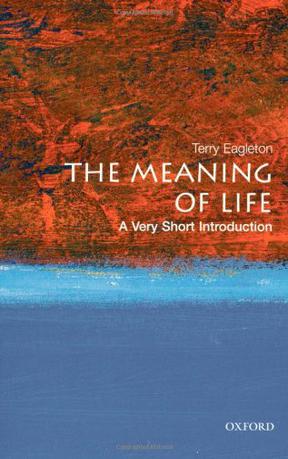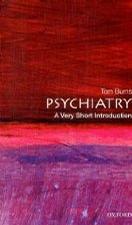-

The Meaning of Life
'Philosophers have an infuriating habit of analysing questions rather than answering them', writes Terry Eagleton, who, in these pages, asks the most important question any of us ever ask, and attempts to answer it. So what is the meaning of life? In this witty, spirited, and stimulating inquiry, Eagleton shows how centuries of thinkers - from Shakespeare and Schopenhauer to Marx, Sartre and Beckett - have tackled the question. Refusing to settle for the bland and boring, Eagleton reveals with a mixture of humour and intellectual rigour how the question has become particularly problematic in modern times. Instead of addressing it head-on, we take refuge from the feelings of 'meaninglessness' in our lives by filling them with a multitude of different things: from football and sex, to New Age religions and fundamentalism. 'Many of the readers of this book are likely to be as sceptical of the phrase "the meaning of life" as they are of Santa Claus', he writes. But Eagleton contends that in a world where we need to find common meanings, it is important that we set about answering the question of all questions; and, in conclusion, he suggests his own answer. -

Psychiatry
Psychiatry is now a highly visible activity - care in the community, compulsion, suicide, drug and alcohol abuse mean that few people are not touched by it. Indeed one in four of us will consult a psychiatrist in our life time. This book explains what psychiatry is, and what it is not. It starts with the identification of the major mental illnesses and why they are no longer considered just variations of 'normality'. It charts the rise of the Asylum and its demise with the developments of Care in the Community, and the flourishing of psychoanalysis and its later transformation into more accessible psychotherapies. More than any other branch of medicine psychiatry has been attacked and criticised. There is a long catalogue of abuses - from mundane neglect and bizarre treatments through to political abuse by totalitarian regimes. Modern psychiatry too brings with it new controversies such as the medicalization of normal life, the power of the drug companies and the use of psychiatry as an agent of social control.The book does not shy away from outlining these issues but provides the reader with a clear understanding of what psychiatry is capable of, and what it is not capable of, so that they can draw their own conclusions. -

Intelligence
People value their powers of thinking and most of us are interested in why some people seem to drive a highly tuned Rolls Royce brain while others potter along with a merely serviceable Ford Fiesta. This Very Short Introduction describes what psychologists have discovered about how and why people differ in their thinking powers. The book takes readers from no knowledge about the science of human intelligence to a stage where they are able to make judgements for themselves about some of the key questions about human mental ability differences. Each chapter deals with a central issue that is both scientifically lively and of considerable general interest, and is structured around a diagram which is explained in the course of the chapter. The issues discussed include whether there are several different types of intelligence, whether intelligence differences are caused by genes or the environment, the biological basis of intelligence differences, and whether intelligence declines or increases as we grow older. -

Dreaming
What is dreaming, and what causes it? Why are dreams so strange and why are they so hard to remember? Replacing dream mystique with modern dream science, J. Allan Hobson provides a new and increasingly complete picture of how dreaming is created by the brain. Focusing on dreaming to explain the mechanisms of sleep, this book explores how the new science of dreaming is affecting theories in psychoanalysis, and how it is helping our understanding of the causes of mental illness. J. Allan Hobson investigates his own dreams to illustrate and explain some of the fascinating discoveries of modern sleep science, while challenging some of the traditionally accepted theories about the meaning of dreams. He reveals how dreaming maintains and develops the mind, why we go crazy in our dreams in order to avoid doing so when we are awake, and why sleep is not just good for health but essential for life. -

Autism
What causes autism? Is it a genetic disorder, or due to some unknown environmental hazard? Are we facing an autism epidemic? What are the main symptoms, and how does it relate to Asperger syndrome? Everyone has heard of autism, but the disorder itself is little understood. It has captured the public imagination through films and novels portraying individuals with baffling combinations of disability and extraordinary talent, and yet the reality is more often that it places a heavy burden on sufferers and their families. This Very Short Introduction offers a clear statement on what is currently known about autism and Asperger syndrome. Explaining the vast array of different conditions that hide behind these two labels, and looking at symptoms from the full spectrum of autistic disorders, it explores the possible causes for the apparent rise in autism and also evaluates the links with neuroscience, psychology, brain development, genetics, and environmental causes including MMR and Thimerosal. This short, authoritative, and accessible book also explores the psychology behind social impairment and savantism, and throughout, sheds light on what it is like to live inside the mind of the sufferer. -

Emotion
Was love invented by European poets in the Middle Ages or is it part of human nature? Will winning the lottery really make you happy? Is it possible to build robots that have feelings? These are just some of the intriguing questions explored in this guide to the latest thinking about the emotions. Drawing on a wide range of scientific research, from anthropology and psychology to neuroscience and artificial intelligence, "Emotion: The Science of Sentiment" takes the reader on a fascinating journey into the human heart.